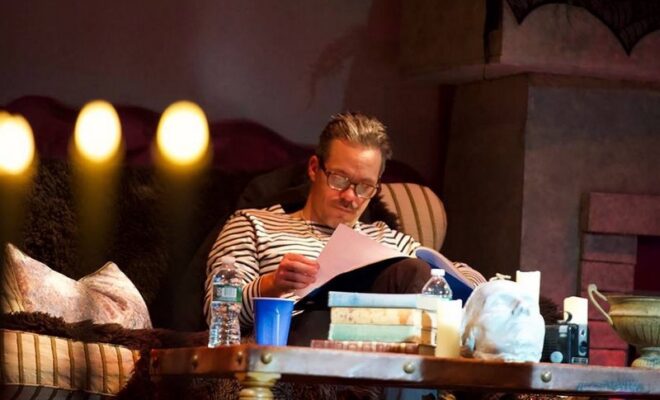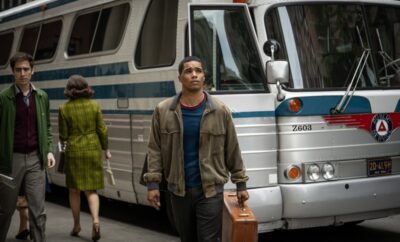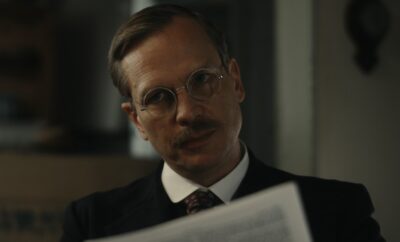 Patrick Oehler/Poughkeepsie Journal
Patrick Oehler/Poughkeepsie Journal
Interviews
Michael Raymond-James – The Missing Peace
By: Dana Jacoviello
Q) This is the first time you have written and directed a short film called The Missing Peace. What inspired you to want to make this movie?
A) Yes, this is my first foray into directing a narrative film, (I did direct a PSA short for the Bullies Keep Out organization several years ago) which is something I have been interested in doing for many years now. It has just been a matter of what the story was going to be and when I could carve enough time to actually do it. I had been kicking an idea around in my mind for some time, but it wasn’t until I was out shoveling snow from my driveway that the story in its entirety really hit me. I can inside and called Tye [Alexander] immediately to see what he thought of the idea, and would he be interested and playing the lead if I could pull it together. This then led to my second call to my co-writer Gabriel Furman. They both said they were down to give it a shot and that’s where the ball really started rolling.
Q) The Missing Peace centers around addiction, which is a great cause that needs more attention. Is there anything specific that led you to choose to focus on that topic to raise awareness?
A) There is something specific about the story that was deeply personal not just to me, but also to other people on the team. Too many to count actually. In fact, I don’t think there is anyone I’ve ever met that hasn’t been affected by addiction in some shape or form, either through their own struggle or the struggle of someone close to them or in their lives in some way. The specifics I will keep private though.
Q) Did you know from the start that you wanted Tyler Alexander to play the lead role of Jackson and why?
A) Tye Alexander was always going to be Jackson. I wrote the character specifically for him. In fact, I did that for every character/actor in the film. I knew who I wanted and then, along with Gabe, was able to write for them with their specific voice in mind. But I have always wanted to give Tye a shot at carrying a film from a lead actor position. He and I go way back more than twenty years and I wanted to write something for him that I knew he would be able to put his shoulder behind and really shine. I always knew that he just needed the right material and a chance, and he would deliver. I’m so happy with what he was able to deliver in the film.
Q) This might sound like an odd question, but was there a significance of the bee, and the fact he woke up every single day replaying each day over and over again?
A) So, it wasn’t a bee, but a fly and there is somewhat of a significance in that Gabe and I wrote it in. We had the fly CGI’d flying around in two sequences and then lying dead in a third shot. We wrote it and shot it, but I always wanted the audience to draw their own conclusions about its significance. In other words, I wasn’t married to any idea about what it’s “supposed to mean.” I have had people come to me after watching the film and say they thought it represented his missing loved one or that maybe something inside of him had died or he got past something inside that was distracting him. And those are all great responses, and they can have a bit of a different effect on each person, which I think is great. Ultimately, though, I never wanted to decide what it was supposed to be. It’s kind of what the late great director William Friedkin describes quite elegantly as “a grace note,” but something I only heard him describe after we shot and finished the film. I was watching a documentary on him and his process, and he started talking about something similar and called it a “grace note.” I thought, “Hey, I think I may have done something similar,” which, I don’t know why, made me a little happy in a weird way, I guess.
The repetition of Jackson’s routine was really accomplishing two things I felt were important. Number one, it’s essentially a device to show the passage of time. It was important to know that this wasn’t Jackson’s first day searching, but number two, I wanted to show his thoroughness. The character has a military background so he was able to lean into the repetitive nature of this kind of search, where first thing in the morning you want to call into the area hospitals, the various jails and even the morgue to see if who you are looking for may have wound up in any of those places. If not, did any of those places receive any Jane Does that might match a description. Then it’s time to hit the streets, talk to people, hand out blankets and stop by treatment centers and methadone clinics, hoping maybe who you’re looking for pops up at one of those places. It’s that sort of routine that can be very grounding when tasked with the immensity of looking for a needle in a haystack. Being methodical and organized inside a world of chaos can be something to hold onto.
Q) With The Missing Peace is the peace finding his sister or just knowing what exactly happened to her?
A) I’m curious what you think the “missing peace” is? This one I can sort of answer, for myself anyway. To me, the pain and the suffering of those people caught up in the wake of addiction is really traumatic. Of course, the pain and suffering experienced by those actually within the throes of addiction are severe as well, but I felt like I have seen films cover that ground extremely well in their own way. I have watched many great films from the perspective of the addict or the perspective of someone who needs to sell drugs in order to survive or some glamorized, romantic version of either of those. I wanted to make a film from the perspective of someone who suffers not from addiction, but from the loss of someone he loves dearly. And not necessarily death, but they are just gone, physically, maybe spiritually as well in that something fundamental inside them has changed as a result of addiction. I wanted to tell a story about those left behind who are searching, no matter what, just to try to bring that person they love back from that brink. And that the people we see on the street, and maybe walk past, who are sleeping on a park bench or under a freeway overpass has someone out there desperately trying to find them, that they are loved, but they are just lost in this brutal wilderness of addiction and can’t find their way out.
Q) How did you find working behind the camera compared to being the artist/actor that you are over so many years?
A) I loved it. It gave me the opportunity to tell a story the way I wanted to, which obviously isn’t something you get to decide simply as an actor. Sure, if you’re in a good situation as an actor you may get some say in the direction a scene or a role take, something that I’ve been fortunate enough to be in during the course of my career. But, ultimately what ends up on the screen in any given moment is someone else’s decision. And that is something I wanted to take on for myself. And, also, as an actor I have had the privilege of working with some incredible behind the camera artists. I always ask cinematographers and camera operators what lens they are on. I always ask directors what they are looking for in a shot that made them decide to shoot from a certain angle or with a certain lens. It has been like a twenty-year film school I’ve gotten to attend while also getting a paycheck.
Q) Did your film come out exactly as you expected and wanted it to?
A) The process of making a film is such an interesting journey. When you make a film, as the saying goes, you actually go to work on three films – there is the film you write, the film you shoot and the film you edit. And that’s actually true. I think it’s important to stay open during that process so that the shifts the film takes on come naturally and organically.
What is the overall message you want to convey to audiences who watch The Missing Peace?
A) I just hope that the people who see the film can hopefully recognize the humanity in those suffering from addiction. And that sometimes people wind up living on the street do to no fault of their own, in the case of mental illness as just one example, or maybe due to bad choices they have made along the way or perhaps, most likely, some combination of both, but that doesn’t make them “throw away” people that don’t have families out there who desperately love them and miss them, and want to find them to get them help. I just hope we could all lead with the level of love that Jackson does, with that level of humanity for those at the bottom rung of society’s ladder.
Q) Did you enjoy making your first film, and do you plan on doing more in the future?
A) Yes, and absolutely to both questions.
Q) Would you consider making The Missing Peace into a full feature film at some point?
A) I have considered it. I think the short leaves space to explore interesting aspects of the other characters that could easily be expanded. In other words, I have a pretty good idea of what I would do to turn it into a feature. However, on the other hand I feel pretty good about having told the story I set out to tell and am happy to leave it there and move on to other projects I’d like to explore.
Q) What are the other recent projects that you have been busy working on – either in front or behind the screen?
A) I have recently wrapped Season 4 of “Godfather of Harlem” in which I play Joe Colombo. I’ve been told it will be coming to MGM+ in the first quarter of 2025. I am currently shooting a multi-episode arc on “FBI: Most Wanted” as well, and have been kicking around ideas with some writers and directors about stories that could be exciting to tell.
Q) What would you like to say to people who continue to be fans and supporters of the wonderful work you do?
A) I would just say Thank You. I’m very grateful for the support. Cheers.





You must be logged in to post a comment Login